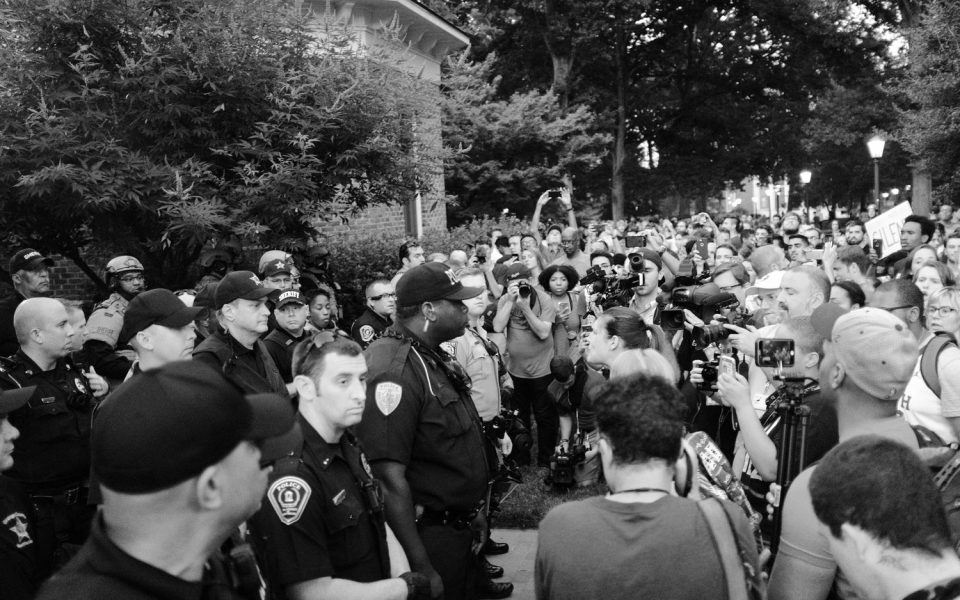Amidst the weekly parade of horrors in the United States, it’s easy to overlook the crackdown on dissent on college campuses.
A new policy regulating speech on the 17 campuses of the University of North Carolina System was approved by the UNC Board of Governors without discussion as part of the consent agenda at its most recent meeting on Dec. 15. There wasn’t much to debate because the new policy was mandated by the Orwellian-named Restore/Preserve Campus Free Speech law ratified by the Republican-controlled General Assembly in late July.
This wasn’t the kind of ambush that generates instant outrage, and in truth political repression on campus is part of a steady creep that affects more than just public universities in North Carolina. But in an era when the president of the United States plays footsie with white nationalists and endorses a child molester who openly expressed nostalgia for slavery, the penalty for student dissent is being ratcheted up.
The North Carolina policy, which protects controversial guest speakers while imposing penalties against students, faculty or staff who engaged in “substantial disrupt[ion],” is part of a wave of repression sweeping over public and private universities across the country. The University of Wisconsin System Board of Regents passed a nearly identical policy in October, and lawmakers in Ohio are considering a similar measure. Even Wake Forest University, a private institution in Winston-Salem, is considering revisions to its Student Code of Conduct prohibiting “substantial disruption,” including “preventing an instructor or speaker from giving a lecture, by means of shouts, interruptions, chants or other verbal or audible means.”
Highly publicized incidents of left-wing students disrupting conservative and far-right guest speakers have seemed to come with increasing frequency since the 2016 election. Rioting by students and antifa visitors prevented former right-wing provocateur and former Breitbart contributor Milo Yiannopoulos from speaking at UC Berkeley in early February. The next month students would shout down political scientist Charles Murray, who has advanced the racist argument that differences in intelligence are partially accounted for by genetics, and hounded him off campus at Middlebury College in Vermont — an incident widely condemned in both conservative and liberal publications.
As a consequence, liberal First Amendment absolutists and conservatives crusading against supposed liberal intolerance have inadvertently made common cause to squelch student protest. But what about the right to righteously denounce bigotry? The ACLU of North Carolina complained that the University of North Carolina policy is vague and overly broad.
“The First Amendment protects both the right of controversial figures to speak on public campuses, and the right of others to peacefully protest those speakers,” said Susanna Birdsong, policy counsel for the civil liberties organization. “Because of its overly broad language, UNC’s policy runs the risk of punishing people for constitutionally protected activities — an ironic outcome for a policy supposedly designed to protect free speech and free expression.”
Also opposing the policy is the state conference of the American Association of University Professors, whose online petition accumulated almost 450 signatures by Dec. 15, according to the News & Observer. The state conference raised the issue that the policy gives preference to speech over counter-speech while arguing that it will make dissent “scary, unsafe and punishable” and “chill healthy academic discourse and debate.”
At least the policy proposed by Wake Forest University specifies the kind of conduct that falls under the category of “substantial disruption.” In contrast, protesters at North Carolina’s public universities have this vague guideline to follow if they want to avoid discipline: “Students, staff and faculty shall be permitted to assemble and engage in spontaneous expressive activity as long as such activity is lawful and does not materially and substantially disrupt the functioning of the constituent institution.”
While liberal free speech advocates in academia and the mainstream media have narrowly focused on the First Amendment, college campuses have become Ground Zero in the battle to halt the spread of white nationalism, from Charlottesville to protests against Silent Sam at UNC-Chapel Hill. Starting in Berkeley at the beginning of the year, the alt right has sought to “trigger” supposed liberal intolerance with pro-Trump rhetoric. White supremacist groups like Identity Evropa melted in with mainstream Young Republicans, hoping to recruit by “red pilling” — the idea that alienated white men will experience an epiphany through confirmation that the forces of multiculturalism, feminism and sexual diversity are arrayed against them.
Unfortunately, there’s little evidence that debating fascists is effective at either converting them or dissuading their followers, and there’s a real risk that it dignifies their putrid ideology and provides a platform for hate. After the alt-right marched through Charlottesville chanting, “Jews will not replace us,” and one of their number accelerated a Dodge Charger into a crowd of marchers, there aren’t as many liberal apologists arguing that a robust democracy requires protections for hate speech.
Join the First Amendment Society, a membership that goes directly to funding TCB‘s newsroom.
We believe that reporting can save the world.
The TCB First Amendment Society recognizes the vital role of a free, unfettered press with a bundling of local experiences designed to build community, and unique engagements with our newsroom that will help you understand, and shape, local journalism’s critical role in uplifting the people in our cities.
All revenue goes directly into the newsroom as reporters’ salaries and freelance commissions.


“White supremacist groups like Identity Evropa melted in with mainstream Young Republicans, hoping to recruit by “red pilling” — the idea that alienated white men will experience an epiphany through confirmation that the forces of multiculturalism, feminism and sexual diversity are arrayed against them.”
If you don’t have the feeling that the forces of multiculturalism and feminism are arrayed against you as a white male on America’s college campuses, you’re not smart enough to be there.